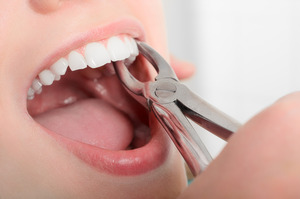
One of the things that puts patients on edge when it comes to oral healthcare is concerns about discomfort. Even people that aren’t particularly anxious about dentistry tend to be a little bit worried when it comes to certain procedures, like tooth extractions.
However, these concerns are largely unfounded—most of the dental care that you’ll receive will be completely painless. Tooth extractions are a good example. If you need to have a tooth removed soon, here’s what you can expect that to feel like.
How Do Tooth Extractions Feel?
Before just about any procedure you receive from a dentist, and especially in the case of intensive ones like tooth extractions, your mouth will treated with a powerful anesthetic. Your dentist will check with you as to how your mouth feels before beginning, ensuring that you’re completely numb before they begin. As a result, the procedure itself is going to be completely painless—the most you’ll likely feel during a tooth extraction is mild pressure.
Discomfort After the Procedure
Once the anesthetics wear off, it’s common to be a little bit tender for a few days. The worst swelling and discomfort should fade after around 3-5 days after the treatment. Until then you can make use of either prescription or OTC pain relievers in order to make yourself more comfortable. Be sure to take these as directed, and follow all other aftercare instructions in order to ensure swift healing.
Managing Aftercare
After a tooth extraction, it’s crucial to follow your dentist’s advice for a smooth recovery. Immediately after the procedure, bite down gently on a gauze pad for 3-4 hours to reduce bleeding and allow a clot to form in the socket. Avoid rinsing, spitting, or sucking actions for the first 24 hours to prevent dislodging the clot. Apply ice to your cheek intermittently to reduce swelling.
After 24 hours, gently rinse with warm salt water. Eat soft foods, gradually reintroducing solid foods as the extraction site heals. Avoid smoking and alcohol, as they can hinder healing. Finally, follow a diligent oral hygiene routine, but be gentle around the extraction site.
About the Author
Dr. Bryan Villescas has been involved with dentistry since he was 16 years old, and he has spend every day since building and maintaining strong relationships with his patients. He feels that trust is essential when it comes to dentistry, and he works very hard to maintain that with every patient that he sees. Dr. Villescas received his degree from the University of Colorado School of Dental Medicine, and has completed hundreds of hours of continuing education ever since.
If you have any questions about tooth extractions, he can be reached at his website or by phone at (941) 627-9900.
